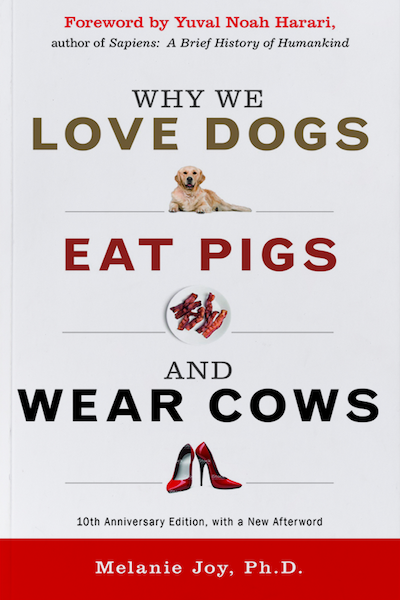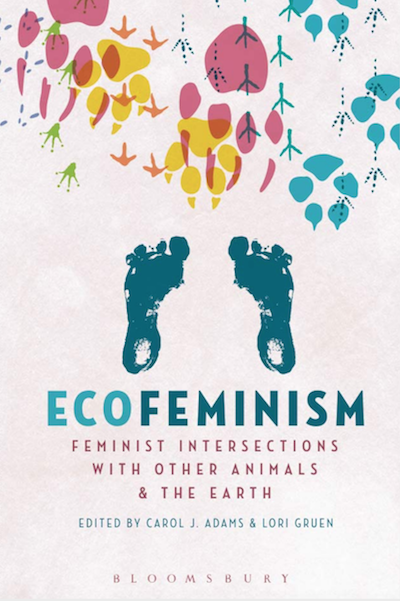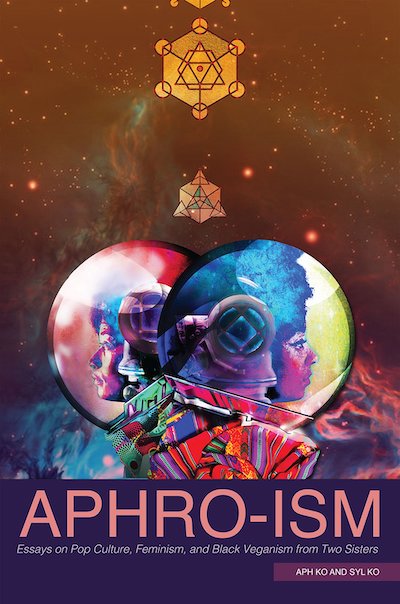Did you know since the 1800s, the animal rights movement has been primarily led by women? (I know, you’re not surprised. What movements aren’t led by women?)
The goals of feminism and veganism may overlap a lot more than we realize. Like women, trans, and non-conforming gender identities living within the patriarchy, animals are objectified, harmed by both domestic and systemic violence, and considered less-than. In fact, animals are considered so less-than that comparing people to animals is widely considered offensive.
If you’re interested in exploring how feminist and animal issues intersect—or if you just like questioning the systems around us—here are five eye-opening books to get you started.
The Sexual Politics of Meat: A Feminist-Vegetarian Critical Theory

Now over thirty years old, The Sexual Politics of Meat is basically the bible of feminist veganism. Carol J. Adams is a writer and advocate who fiercely believes that animal rights is a feminist issue. In The Sexual Politics of Meat, Adams confronts prevailing obsessions with meat and masculinity and shows how veganism challenges the patriarchy.
“If the body becomes a special focus for women’s struggle for freedom then what is ingested is a logical initial locus for announcing one’s independence.”
– Carol J. Adams, The Sexual Politics of Meat
Sistah Vegan: Black Women Speak on Food, Identity, Health, and Society

Dr. A. Breeze Harper is a writer, public speaker and critical race feminist scholar. Her book Sistah Vegan comprises essays and poems by Black women vegans—including “Young, Black, and Vegan” by Joi Maria Probus; “Being a Sistah at PETA” by Ain Drew, and the poem “Stop Feeding Me Your Bullshi*t” by Tishana Joy Trainor. In Dr. Harper’s words: “Sistah Vegan is an in-your-face handbook for our time.”
“Veganism is an expression of ecowomanism because it is a practice rooted in conscious harmlessness, which is a major tenet of ecowomanism’s healing praxis.”
– Layli Phillips in her essay “Veganism and Ecowomanism,” Sistah Vegan
Why We Love Dogs, Eat Pigs, and Wear Cows: An Introduction to Carnism

Why We Love Dogs, Eat Pigs, and Wear Cows is the perfect introduction for those curious about veganism. Psychology and sociology professor Dr. Melanie Joy defines the term carnism as the belief system that conditions us to eat certain animals. She writes about how, just like the patriarchy existed before feminists gave it a label, carnism has been a dominant ideology for a long time.
“[W]hat we refer to as mainstream is simply another way to describe an ideology that is so widespread—so entrenched—that its assumptions and practices are seen as simply common sense. It is considered fact rather than opinion, its practices a given rather than a choice.”
– Melanie Joy, Why We Love Dogs, Eat Pigs, and Wear Cows
Ecofeminism: Feminist Intersections with Other Animals & The Earth

This time Carol J. Adams is joined by co-editor Lori Gruen, an animal studies and feminist philosophy scholar. Their book Ecofeminism is divided into two sections—“Affect,” which includes chapters by various authors about compassion, sympathy and ethics, and “Context,” which digs into everything from speciesism to Michael Vick.
“Ecofeminism addresses the various ways that sexism, heteronormativity, racism, colonialism, and ableism are informed by and support speciesism and how analyzing the ways these forces intersect can produce less violent, more just practices.”
– Carol J. Adams and Lori Gruen in their introduction to Ecofeminism
Aphro-ism: Essays on Pop Culture, Feminism, and Black Veganism from Two Sisters

Aphro-ism is the newest book on this list, published in 2017 by sisters and activists Aph and Syl Ko. Centered around pop culture, the book analyzes contemporary social movements and advocates for more interconnected frameworks to move forward—particularly through a lens of Afrofuturism. Aphro-ism asks that you think critically about the true meaning of liberation.
“The very same thing that affords us [women] this status of perpetual beauty, however, also makes us exploitable. Because we are distanced from subjecthood, because we are alien and different, mystical creatures, passive beautiful things to be apprehended from afar, we are also forced into perpetual object status.”
– Syl Ko in her essay “Women, Beauty, and Nature,” Aphro-ism


